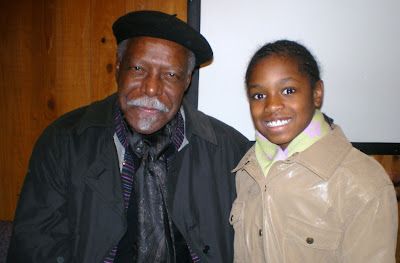
from Critical Noir @ Vibe.com
Notes from a Soul Jazz Summit
by Mark Anthony Neal
Historically Soul Jazz—a species of the Jazz tradition that is actively in conversation with Soul and Rhythm & Blues music—has been given short shrift by jazz traditionalists. Often thought of as the precursor to jazz fusion—and thus the end of all civilization for some—Soul Jazz and its most popular practitioners, including organists Jimmy Smith and “Big” John Patton, guitarist Grant Green, and alto saxophonist Julian "Cannonball" Adderley are rarely mentioned alongside more traditional jazz elites. Recently Duke Performances, under the direction of Aaron Greenwald, paid tribute to Soul Jazz and its legacy with A Soul Jazz Summit, featuring the Dr. Lonnie Smith Trio and saxophonists Houston Person, David “Fathead” Newman, and North Carolina native Lou Donaldson. The concert was the kick-off event for Duke Performances’ six week series Soul Power! From Gospel to the Godfather.
For some, Soul Jazz wasn’t art, but simply good time music that anybody could play. I have all too vivid a memory of a clerk at the old Lincoln Center/66th street Tower Records in NYC deriding the music of The Crusaders and Grover Washington, Jr. while giving advice to novice Jazz fans as to what “real” and “good” Jazz music was. Ironically many of the most popular Soul Jazz musicians of the late 1950s and 1960s came of age cutting their teeth playing Be-Bop—the so-called Holy Grail of all jazz genres. These musicians though, perhaps more than any other generation of jazz performers, were ever aware of the ways that the music was losing connection with the very communities that birthed it. Organ trios, like the one that Dr. Lonnie Smith led, which simply featured a drummer, guitarist and a Hammond B-3 player, were staples of black clubs in the 1950s and 1960s, if only because they demanded so little space.
But Soul Jazz was also music that was rooted in the everyday lives of black folk, particularly poor and working class folk, who wanted to spend their money, above all, to have a good time. Longtime Jazz Crusader and pianist Joe Sample (whose “In My Wildest Dreams” provides the sample for Tupac’s “Dear Momma”) once recalled the Crusaders opening for some Rhythm and Blues acts in a Texas barn during the late 1950s and customers, who had paid their “hard earned quarters” to “have a good time,” admonishing them (with threats of violence) about playing Hard Bop Jazz. And while some Jazz musicians indeed recorded some of their most popular tracks in the Soul Jazz idiom, to simply see their choices as catering to the marketplace, misses the point of it all. Additionally, this is not to say, that black audiences weren’t interested in Be-Bop or the Free Jazz of Albert Ayler, Cecil Taylor or Pharaoh Sanders, but like many a “conscious” rapper will tell you, folk ain’t all that interested in “thinking” about their music, when they are trying to “escape” the world.
Read the Full Essay at CRITICAL NOIR @ Vibe.com
No comments:
Post a Comment